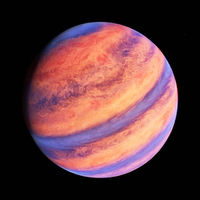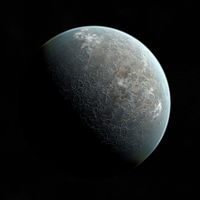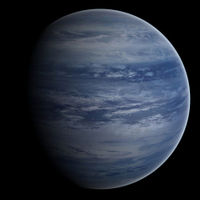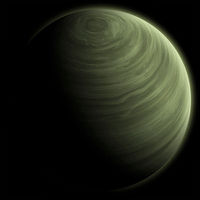|
|
| (7 intermediate revisions by 4 users not shown) |
| Line 5: |
Line 5: |
| |region=[[starwars:Unknown Regions|Unknown Regions]] | | |region=[[starwars:Unknown Regions|Unknown Regions]] |
| |sector= | | |sector= |
| |coordinates= | | |coordinates=G-13 |
| |xyz= | | |xyz= |
| |suns=*Aliso I | | |suns=*Aliso I |
| Line 31: |
Line 31: |
| |affiliation=*[[Starwars:Confederacy of Independent Systems|Confederacy of Independent Systems]] | | |affiliation=*[[Starwars:Confederacy of Independent Systems|Confederacy of Independent Systems]] |
| *[[Clan]] [[Clan Plagueis|Plagueis]] | | *[[Clan]] [[Clan Plagueis|Plagueis]] |
| }}The '''Aliso system''' is a bianary system consisting of an F-type main-sequence star and a smaller, near-solar T class brown dwarf companion. The system primary is orbited by five planets, three gas giants and two terrestrial. [[Aliso]] is the only habitable terrestrial planet or moon in the solar system. Tonus, a class I gas giant, is also the home of Plagueis' tactical base of operations and shipyard facility [[the Anchorage]]. Hidden within its upper atmosphere, the Anchorage is protected from outside detection by pockets of electromagnetic interference. | | |item= [[item:79899|ID 79899]] |
| | }}The '''Aliso system''' is a binary system consisting of an F-type main-sequence star and a smaller, near-solar T class brown dwarf companion. The system primary is orbited by five planets, three gas giants and two terrestrial. [[Aliso]] is the only habitable terrestrial planet or moon in the solar system. Tonus, a class I gas giant, is also the home of Plagueis' tactical base of operations and shipyard facility [[the Anchorage]]. Hidden within its upper atmosphere, the Anchorage is protected from outside detection by pockets of electromagnetic interference. |
|
| |
|
| ==Stellar Objects == | | ==Stellar Objects == |
| Line 43: |
Line 44: |
| === Pecarro === | | === Pecarro === |
| [[file:Pecarro.jpg|thumb|200px|Pecarro]] | | [[file:Pecarro.jpg|thumb|200px|Pecarro]] |
| {{main|Pecarro}}
| | |
| *Diameter: 148,000 km | | *Diameter: 148,000 km |
| *Orbital distance: 47 million km | | *Orbital distance: 47 million km |
| Line 52: |
Line 53: |
| *Surface temperature: 2,100° C | | *Surface temperature: 2,100° C |
| *Composition: Gaseous | | *Composition: Gaseous |
| | *Item: [[item:79971|ID 79971]] |
|
| |
|
| Pecarro is the innermost planet of the solar system which orbits Aliso I. As an epistellar jovian, Pecarro orbits Aliso I in a tight, tidally locked orbit of only 82 days. The planet has extreme and exotic atmospheres due to its short periods and tidal locking. The atmosphere demonstrates strong vertical stratification with intense winds and super-rotating equatorial jets driven by radiative forcing and the transfer of heat and momentum. The day-night temperature difference at the photosphere is substantial, generally varying by approximately 1,000 degrees Celsius. Additionally, Pecarro is much less dense than similar sized gas giants that exist further from their star. This could be as a result of a number of factors, ranging from high stellar irradiation, high atmospheric opacity, possible internal energy sources, and an orbit close enough to Aliso I for the outer layers of Pecarro to exceed the Roche limit and be pulled further outward. | | Pecarro is the innermost planet of the solar system which orbits Aliso I. As an epistellar jovian, Pecarro orbits Aliso I in a tight, tidally locked orbit of only 82 days. The planet has extreme and exotic atmospheres due to its short periods and tidal locking. The atmosphere demonstrates strong vertical stratification with intense winds and super-rotating equatorial jets driven by radiative forcing and the transfer of heat and momentum. The day-night temperature difference at the photosphere is substantial, generally varying by approximately 1,000 degrees Celsius. Additionally, Pecarro is much less dense than similar sized gas giants that exist further from their star. This could be as a result of a number of factors, ranging from high stellar irradiation, high atmospheric opacity, possible internal energy sources, and an orbit close enough to Aliso I for the outer layers of Pecarro to exceed the Roche limit and be pulled further outward. |
| Line 74: |
Line 76: |
| === Trecurus === | | === Trecurus === |
| [[file:Trecurus.jpg|thumb|200px|Trecurus]] | | [[file:Trecurus.jpg|thumb|200px|Trecurus]] |
| {{main|Trecurus}}
| | |
| *Diameter: 6,779 km | | *Diameter: 6,779 km |
| *Orbital distance: 592 million km | | *Orbital distance: 592 million km |
| *Orbital period: 886 days | | *Orbital period: 886 days |
| *Rotation period: 82 days | | *Rotation period: 58 days |
| *Moons: None | | *Moons: None |
| *Atmosphere: Type IV | | *Atmosphere: Type IV |
| *Surface temperature: −63 °C | | *Surface temperature: −63 °C |
| *Composition: Terrestrial | | *Composition: Terrestrial |
| | *Item: [[item:79973|ID 79973]] |
|
| |
|
| Trecurus is a completely uninhabitable world that is third in orbit around Aliso I at a distance of 592 million kilometers. Believed to originally have been a moon of Cogrion that was ejected from orbit and captured by Aliso I, Trecurus is a geologically dead world with a very light atmosphere. | | Trecurus is a completely uninhabitable world that is third in orbit around Aliso I at a distance of 592 million kilometers. Believed to originally have been a moon of Cogrion that was ejected from orbit and captured by Aliso I, Trecurus is a geologically dead world with a very light atmosphere. |
| {{clear}} | | {{clear}} |
| | |
| === Cogrion === | | === Cogrion === |
| [[file:Cogrion.jpg|thumb|200px|Cogrion]] | | [[file:Cogrion.jpg|thumb|200px|Cogrion]] |
| {{main|Cogrion}}
| | |
| *Diameter: 142,000 km | | *Diameter: 142,000 km |
| *Orbital distance: 942 million km | | *Orbital distance: 942 million km |
| Line 97: |
Line 101: |
| *Surface temperature: −55 °C | | *Surface temperature: −55 °C |
| *Composition: Gaseous | | *Composition: Gaseous |
| | *Item: [[item:79974|ID 79974]] |
|
| |
|
| Cogrion, a class II gas giant, is the fourth planet from Aliso I. While well outside the habitable zone at an orbit of 942 million kilometers, the bulk of the gas giant's water exists as vapor in the dense, thick atmosphere. This is due to heavy gravitational pressure from the core and convection produced within the atmosphere constantly pushing heat from the core throughout the layers. Cogrion also serves as a comet-catcher for the inner system, more specifically Aliso, by gravitationally flinging incoming comets out of the system. | | Cogrion, a class II gas giant, is the fourth planet from Aliso I. While well outside the habitable zone at an orbit of 942 million kilometers, the bulk of the gas giant's water exists as vapor in the dense, thick atmosphere. This is due to heavy gravitational pressure from the core and convection produced within the atmosphere constantly pushing heat from the core throughout the layers. Cogrion also serves as a comet-catcher for the inner system, more specifically Aliso, by gravitationally flinging incoming comets out of the system. |
| Line 102: |
Line 107: |
| === Tonus === | | === Tonus === |
| [[file:Tonus.jpg|thumb|200px|Tonus]] | | [[file:Tonus.jpg|thumb|200px|Tonus]] |
| {{main|Tonus}}
| | |
| *Diameter: 121,000 km | | *Diameter: 121,000 km |
| *Orbital distance: 5.89 billion km | | *Orbital distance: 5.89 billion km |
| Line 111: |
Line 116: |
| *Surface temperature: −201 °C | | *Surface temperature: −201 °C |
| *Composition: Gaseous | | *Composition: Gaseous |
| | *Item: [[item:79975|ID 79975]] |
|
| |
|
| Tonus is a class I gas giant and the outermost planet in the Aliso system at an orbit of 5.89 billion kilometers. Hidden within a tranquil pocket of its turbulent, electromagnetically charged atmosphere of ammonia is the Anchorage, Plagueis' secondary base of operations and strategic naval operations center. | | Tonus is a class I gas giant and the outermost planet in the Aliso system at an orbit of 5.89 billion kilometers. Hidden within a tranquil pocket of its turbulent, electromagnetically charged atmosphere of ammonia is the Anchorage, Plagueis' secondary base of operations and strategic naval operations center. |
| | |
| | {{Plagueis}} |
|
| |
|
| [[Category:Star Systems]][[Category:Plagueis territories]] | | [[Category:Star Systems]][[Category:Plagueis territories]] |
The Aliso system is a binary system consisting of an F-type main-sequence star and a smaller, near-solar T class brown dwarf companion. The system primary is orbited by five planets, three gas giants and two terrestrial. Aliso is the only habitable terrestrial planet or moon in the solar system. Tonus, a class I gas giant, is also the home of Plagueis' tactical base of operations and shipyard facility the Anchorage. Hidden within its upper atmosphere, the Anchorage is protected from outside detection by pockets of electromagnetic interference.
Stellar Objects
Aliso I
 Aliso I
Aliso I Aliso I is a F-class main sequence star with a diameter of about 1.89 million kilometers. It is located on the edge of the Unknown Regions and its solar system serves as the home for Clan Plagueis.
Aliso II
 Aliso II
Aliso II Aliso II is a near-solar T class brown dwarf that has a moderately eccentric and inclined orbit around Aliso I. A pale magenta color, Aliso I orbits nearly 0.9 light years away from Aliso I making it the furthest most object in the solar system, and also marks the boundaries edge.
Orbits
Pecarro
 Pecarro
Pecarro
- Diameter: 148,000 km
- Orbital distance: 47 million km
- Orbital period: 82 days
- Rotation period: 82 days
- Moons: None
- Atmosphere: Type IV
- Surface temperature: 2,100° C
- Composition: Gaseous
- Item: ID 79971
Pecarro is the innermost planet of the solar system which orbits Aliso I. As an epistellar jovian, Pecarro orbits Aliso I in a tight, tidally locked orbit of only 82 days. The planet has extreme and exotic atmospheres due to its short periods and tidal locking. The atmosphere demonstrates strong vertical stratification with intense winds and super-rotating equatorial jets driven by radiative forcing and the transfer of heat and momentum. The day-night temperature difference at the photosphere is substantial, generally varying by approximately 1,000 degrees Celsius. Additionally, Pecarro is much less dense than similar sized gas giants that exist further from their star. This could be as a result of a number of factors, ranging from high stellar irradiation, high atmospheric opacity, possible internal energy sources, and an orbit close enough to Aliso I for the outer layers of Pecarro to exceed the Roche limit and be pulled further outward.
Asteroid Belt
 Belt asteroids.
Belt asteroids. The Aliso system asteroid belt orbits Aliso I at a distance of about 165 to 219 million kilometers. A large amount of debris, the asteroid belt is believed to be an early remnant of the protoplanetary disk formation as later planets were beginning to coalesce. As one or more planets were forming in this range, the gravitational stress from the tightly packed early solar system, and the pull from the Aliso star, and the massive gas giants Pecarro, and Cogrion, ripped the early protoplanets apart creating the asteroid belt. This also allowed for Aliso to settle into a more stable orbit between the two gas giants comfortably, and also in a more habitable zone for life.
Aliso
 Aliso
Aliso
- Main article: Aliso
- Diameter: 13,942 km
- Orbital distance: 417 million km
- Orbital period: 408 days
- Rotation period: 26 hours
- Moons: Ladera
- Atmosphere: Type I
- Surface water: 82%
- Composition: Terrestrial
Aliso is a habitable terrestrial world that is home to Clan Plagueis. Recovering from a volcanic winter, mixed with its habitable zone orbit of 417 million kilometers, has created a planetary climate of a constant autumn. It is also the location of the Pinnacle, the base of operations for Clan Plagueis.
Trecurus
 Trecurus
Trecurus
- Diameter: 6,779 km
- Orbital distance: 592 million km
- Orbital period: 886 days
- Rotation period: 58 days
- Moons: None
- Atmosphere: Type IV
- Surface temperature: −63 °C
- Composition: Terrestrial
- Item: ID 79973
Trecurus is a completely uninhabitable world that is third in orbit around Aliso I at a distance of 592 million kilometers. Believed to originally have been a moon of Cogrion that was ejected from orbit and captured by Aliso I, Trecurus is a geologically dead world with a very light atmosphere.
Cogrion
 Cogrion
Cogrion
- Diameter: 142,000 km
- Orbital distance: 942 million km
- Orbital period: 5,276 days
- Rotation period: 14 hours
- Moons: Many
- Atmosphere: Type IV
- Surface temperature: −55 °C
- Composition: Gaseous
- Item: ID 79974
Cogrion, a class II gas giant, is the fourth planet from Aliso I. While well outside the habitable zone at an orbit of 942 million kilometers, the bulk of the gas giant's water exists as vapor in the dense, thick atmosphere. This is due to heavy gravitational pressure from the core and convection produced within the atmosphere constantly pushing heat from the core throughout the layers. Cogrion also serves as a comet-catcher for the inner system, more specifically Aliso, by gravitationally flinging incoming comets out of the system.
Tonus
 Tonus
Tonus
- Diameter: 121,000 km
- Orbital distance: 5.89 billion km
- Orbital period: 87.6 years
- Rotation period: 14 hours
- Moons: Many
- Atmosphere: Type IV
- Surface temperature: −201 °C
- Composition: Gaseous
- Item: ID 79975
Tonus is a class I gas giant and the outermost planet in the Aliso system at an orbit of 5.89 billion kilometers. Hidden within a tranquil pocket of its turbulent, electromagnetically charged atmosphere of ammonia is the Anchorage, Plagueis' secondary base of operations and strategic naval operations center.